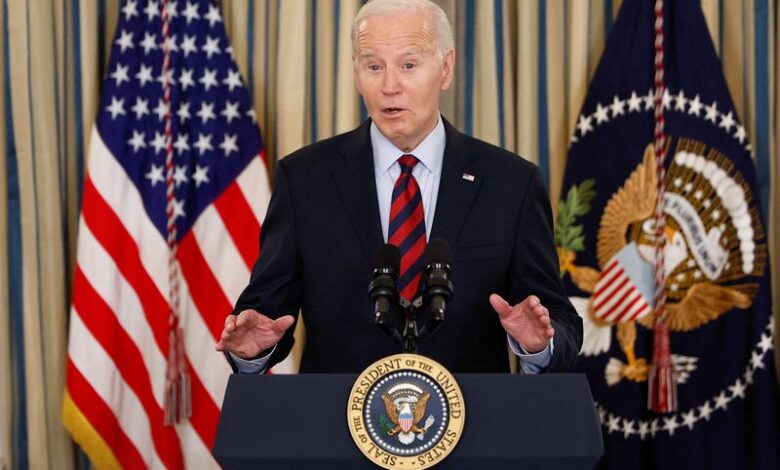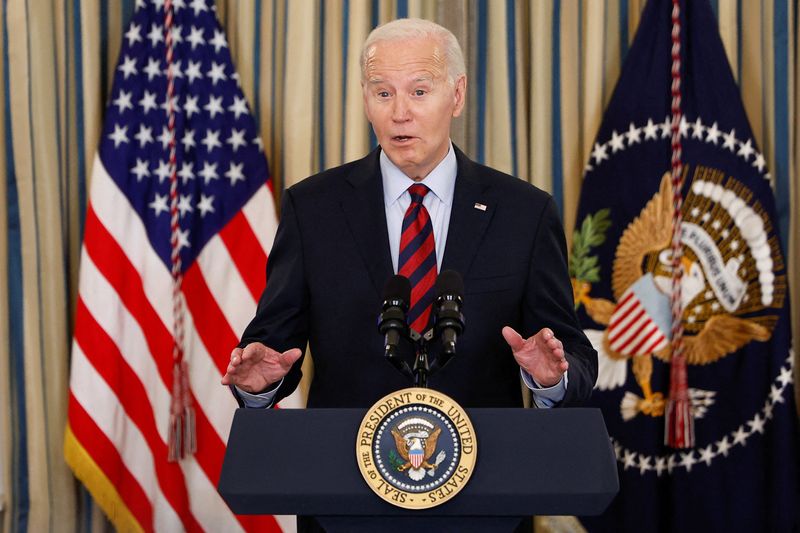State of the Union: Biden vows to raise taxes on wealthy, corporations


© Reuters. FILE PHOTO: U.S. President Joe Biden delivers remarks before a meeting of his Competition Council, in the State Dining Room at the White House in Washington, U.S., March 5, 2024. REUTERS/Evelyn Hockstein/File Photo
By David Lawder
WASHINGTON (Reuters) -U.S. President Joe Biden vowed Thursday to raise taxes on wealthy Americans and large companies, announcing plans in his State of the Union address to hike corporate minimum taxes and cut deductions for executive pay and corporate jets.
Biden previewed the steps that will be part of a proposed fiscal 2025 budget released next week that aims to decrease the federal deficit by $3 trillion over 10 years while cutting taxes for low-income Americans and aiding middle-class homebuyers.
He proposed a new tax credit that would help Americans buy first homes or trade up to larger ones by providing the equivalent of $400 per month for the next two years to offset high mortgage rates. Biden also called for the elimination of title insurance on refinancings of federally backed mortgages, a move that can save homeowners $1,000 or more.
The tax plans are expected to form a core part of the Democratic president’s re-election campaign, contrasting with Republican candidate Donald Trump, who signed a 2017 law that slashed taxes on companies, the wealthy and many middle-class Americans.
“I’m a capitalist. You want to make a million, or millions of bucks? That’s great. Just pay your fair share in taxes,” Biden said, adding that the Trump-era tax cuts “exploded the federal deficit.”
Most of Biden’s tax proposals have little chance of enactment unless Democrats win strong majorities in both chambers of Congress in November, a sweep that polls suggest is unlikely.
In addition to previous calls to raise the corporate income tax rate to 28% from 21% currently, he called for an increase to “at least 21%” for the 15% corporate minimum tax that he won as part of 2022 clean energy legislation. The tax applies to firms reporting over $1 billion in profits.
Biden administration officials also told reporters he wants to quadruple the 1% tax on corporate stock buybacks approved in 2022.
TAX BREAK CURBS
Biden also urged Congress to approve far stricter limits on business income deductions for executive pay, limiting them to $1 million for any given employee.
Current law prohibits deductions on compensation for chief executive officers, chief financial officers and other key positions. White House officials said the new proposal would cover all employees paid more than $1 million, and raise more than $250 billion in new corporate tax revenue over 10 years.
Biden also called for Congress to go after business income deductions for the use of corporate jets, an area already targeted for audits by the Internal Revenue Service. This includes extending the depreciation period for corporate jets to seven years, the same as commercial aircraft, from five years currently, reducing annual deductions, an administration official said.
Biden renewed his call for a “billionaire tax” that would impose a 25% minimum tax on income for those Americans with wealth of more than $100 million, saying it would raise $500 billion over 10 years to help fund benefits such as child care and paid family leave.
The average American worker paid about a 25% tax rate in 2022, the OECD reported. Biden said the average tax rate for some 1,000 billionaires was 8.2%, adding: “No billionaire should pay a lower tax rate than a teacher, a sanitation worker, a nurse.”
He pledged to extend Trump-era tax cuts for those earning under $400,000 and revive a COVID-era expansion of the Child Tax Credit and increase a tax credit for low-wage workers.
Biden’s latest proposals drew a sharp rebuke from the U.S. Chamber of Commerce, which has made preserving the 2017 Republican tax cuts a top priority.
Biden’s policies “would actually result in lower economic growth, fewer new business starts, less job creation, and fewer choices for American families,” said Neil Bradley, the Chamber’s chief policy officer.
But Chuck Marr, who heads tax policy at the left-leaning Center on Budget and Policy Priorities, said Biden’s “course correction” would make the U.S. tax system fairer.
“President Biden’s tax proposals recognize that the 2017 Trump tax law – as exemplified in the corporate tax rate cut – was skewed to the wealthy, expensive, and failed to deliver on its promises,” Marr said.
FIGHTING ‘JUNK FEES’
As consumers continue to face high prices, Biden also said his administration would continue to crack down on “price gouging” including “junk fees” added to stated prices, and smaller package sizes – the “shrinkflation” bemoaned on Monday by Sesame Street muppet Cookie Monster in an X social media post.
After a move this week to cap credit card late fees at $8, Biden said this would save Americans $20 billion and banks were “mad” about it.
“I’m not stopping there. My new administration is proposing rules on cable, travel, utilities, online ticket sellers, telling you the total price upfront. So there are no surprises. It matters,” he added.



